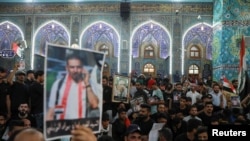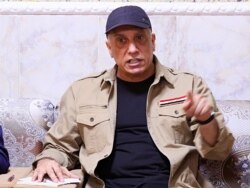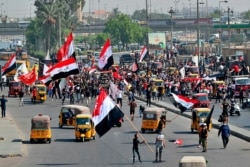Iraqi media are reporting on stepped up efforts to find whoever killed a protester Sunday night and attempted to kill a journalist. Crowds of mostly young men set fire to the perimeter of the Iranian consulate in Karbala after the attacks, as Prime Minister Mustafa al-Khadhimi vows to find and arrest the perpetrators.
The assassination of a protester in the Iraqi Shi'ite shrine town of Karbala Sunday night, along with the attempted assassination of a journalist in Diwaniya, led protesters to set fires outside the Iranian consulate, prompting an outcry from Tehran. Protesters set fire to the same consulate in November 2019.
Iraqi Prime Minister Mustafa al-Khadhimi, himself a former journalist, vowed to uncover and prosecute those who were behind the latest attacks, as well as previous killings of protesters.
He told journalists that an investigative committee has been set up, including a group of retired judges with experience, to investigate and question witnesses to determine what happened and eventually reach a conclusion.
Top Shi'ite leaders Ammar Hakim and Muqtada Sadr both protested the shootings. Hakim said, "efforts to assassinate protesters and journalists to stop their voices from being heard seem aimed at making the situation worse in the country." Sadr called the killing "a cowardly tactic" and urged Iraqis to "stay calm."
Iraqi analyst Salem Mashkour tells VOA that the current violence is part of a "political conflict between Iran on one side and the U.S. and Saudi Arabia on the other," and that Iraq is "caught in the middle."
The country is gearing up for parliamentary elections on June 6, and Mashkour argues that some groups are trying to force the government to postpone them.
“There was a goal to delay the election. Somebody wants to postpone the election. That’s why they create violence in the street — to create a difficult security situation which [will] prevent the election,” he said.
Khattar Abou Diab, who teaches political science at the University of Paris, notes that many young Iraqis, both Sunni and Shi'ite, would like to see an independent state, and that objective has brought mostly young protesters into the streets.
He says that the pro-Iranian militias, which are part of the "popular mobilization forces" known as Al-Hushd al-Sha'abi in Arabic, have a logic of violence, and since they have been unable to put down the street protests, they have tried to knock off various leaders of the movement.
Popular protests against the Iraqi government began in the summer of 2019 in the port city of Basra amid shortages of clean water, fuel and electricity. They later spread to Baghdad and other cities in October 2019. Former prime minister Adel Abdul Mehdi resigned in May 2020, giving way to Khadhimi, who is not aligned with the U.S. or Iran.














